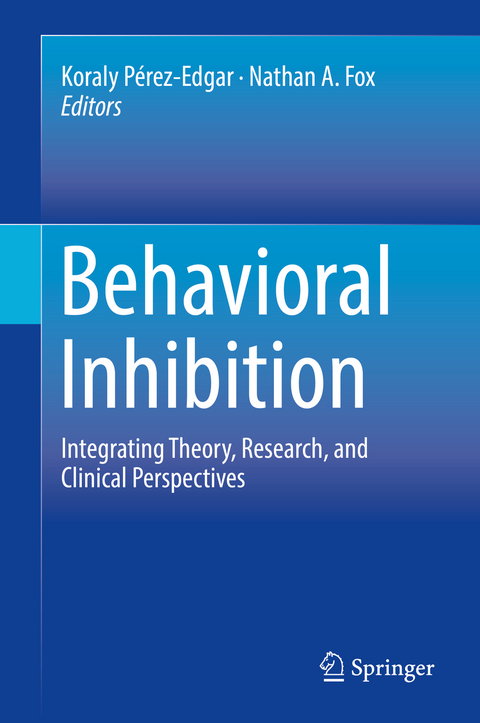
Behavioral Inhibition
Springer International Publishing (Verlag)
978-3-319-98076-8 (ISBN)
Key areas of coverage include:
Animal models of behavioral inhibition.
Social functioning and peer relationships in BI.
Attention mechanisms in behavioral inhibition.
BI and associative learning of fear.
Behavioral inhibition and prevention of internalizing distress in early childhood.
The relations between BI, cognitive control, and anxiety. Behavioral Inhibition is a must-have resource for researchers, clinicians, scientist-practitioners, and graduate students across such fields as developmental psychology, psychiatry, social work, cognitive and affective developmental neuroscience, child and school psychology, educational psychology, and pediatrics.
Koraly Pérez-Edgar, Ph.D., is the McCourtney Professor of Child Studies and a Professor of Psychology at The Pennsylvania State University. She received her A.B. from Dartmouth College and Ph.D. from Harvard University. Dr. Pérez-Edgar's research focuses on the relations between temperament and psychopathology. In particular, she examines how individual differences in attention can work to ameliorate or exacerbate risks associated with early temperament traits. Dr. Pérez-Edgar is a fellow of the Association for Psychological Science. Nathan A. Fox, Ph.D., is a Distinguished University Professor of Human Development at the University of Maryland. He received his B.A. from Williams College and Ph.D. from Harvard University. Dr. Fox is a world-recognized leader in the study of early behavioral inhibition, the impact of early life events on development, and the biological underpinning of development. Dr. Fox is a Fellow of the American Association for the Advancement of Science, the Association for Psychological Science, and the American Academy of Arts and Sciences.
Chapter 1. The History and Theory of Behavioral Inhibition.- Chapter 2. Behavioral Inhibition in Nonhuman Primates: The Elephant in the Room.- Chapter 3. Behavioral Inhibition in Rodents: A Model to Study Causes and Health Consequences of Temperament.- Chapter 4. The Neural Mechanisms of Behavioral Inhibition.- Chapter 5. Psychobiological Processes in the Development of Behavioral Inhibition.- Chapter 6. The Neurobiology of Behavioral Inhibition as a Developmental Mechanism.- Chapter 7. The Social World of Behaviorally Inhibited Children: A Transactional Account.- Chapter 8. Peer Relations and the Behaviorally Inhibited Child.- Chapter 9. The Temperamentally Shy Child as the Social Adult: An Exemplar of Multifinality.- Chapter 10. Relations Between Behavioral Inhibition, Cognitive Control and Anxiety: Novel Insights Provided by Parsing Subdomains of Cognitive Control.- Chapter 11. Attention Mechanisms in Behavioral Inhibition: Exploring, and Exploiting, the Environment.- Chapter 12. Behavioral Inhibition and the Associative Learning of Fear.- Chapter 13. Behavioral Inhibition as a Precursor to Psychopathology.- Chapter 14. The Biological Bridge Between Behavioral Inhibition and Psychopathology.- Chapter 15. Behavioural Inhibition and the Prevention of Internalising Distress in Early Childhood.- Chapter 16. Next Steps: Behavioral Inhibition as a Model System.
| Erscheinungsdatum | 04.10.2018 |
|---|---|
| Zusatzinfo | XV, 380 p. 13 illus., 9 illus. in color. |
| Verlagsort | Cham |
| Sprache | englisch |
| Maße | 155 x 235 mm |
| Gewicht | 751 g |
| Themenwelt | Geisteswissenschaften ► Psychologie ► Entwicklungspsychologie |
| Medizin / Pharmazie ► Medizinische Fachgebiete ► Psychiatrie / Psychotherapie | |
| Sozialwissenschaften ► Pädagogik ► Sozialpädagogik | |
| Schlagworte | Amygdala model of BI • Behavioral inhibition and animal models • Behavioral inhibition and psychopathology • Behavioral inhibition (BI) as a model system • Behavioral inhibition theory and history • Biological markers and behavioral inhibition • Child development and behavioral inhibition • Cognition and behavioral inhibition • Developmental trajectories and behavioral inhibiti • Developmental trajectories and behavioral inhibition • Development and behavioral inhibition • Environmental conditions and BI • Environmental threats and BI • Evolutionary mechanisms and behavioral inhibition • Jerome Kagan and behavioral inhibition • Neural mechanisms of behavioral inhibition • Peer relationships and BI • Psychophysiology and behavioral inhibition • Rodent model and BI • Social anxiety, social withdrawal, and BI • Temperament and behavioral inhibition |
| ISBN-10 | 3-319-98076-9 / 3319980769 |
| ISBN-13 | 978-3-319-98076-8 / 9783319980768 |
| Zustand | Neuware |
| Haben Sie eine Frage zum Produkt? |
aus dem Bereich


